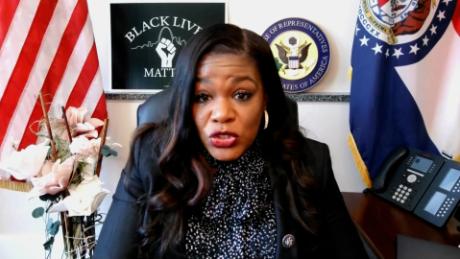(CNN)Progressive Democratic Rep. Ilhan Omar of Minnesota is reintroducing three policing bills she hopes will be incorporated into the bipartisan package lawmakers have been fine-tuning for weeks as pressure mounts on Congress to pass meaningful legislation that will impose new police practices across the country.
All three bills were first introduced in the last Congress, but their reintroduction now underscores the pressure that the left continues to place on police legislation negotiations. Given their narrow majority in the House, Democrats can lose only a handful of votes and still pass legislation through the chamber, meaning any widespread opposition from progressives could spell trouble for the bill.
The most significant legislation Omar is reintroducing would establish an independent federal agency to investigate deaths that happened under police custody, officer-involved shootings and uses of force that resulted in severe bodily injury. The board would be composed of eight members appointed by the President and at the advice and consent of the Senate.
"We're in the midst of a national reckoning that recognizes our history of systematic racism and we need to have systemwide reforms," Omar said in an interview with CNN. "History shows that the criminal justice system is not equipped to prosecute itself."
Speaking about the role the federal agency would play, Omar added, "It's really important that we recognize there is a need for a separate agency to investigate police use of force in an unbiased manner."
A member of "The Squad," Omar is also seeking to make it a federal crime for an officer to kill or cause bodily harm to a civilian during a protest and to introduce a resolution that calls on Congress to stand with peaceful protesters as instances of police brutality continue.
Omar's new legislation, which she views as "important additions" to the George Floyd Justice in Policing Act, which already passed the House, comes as a bipartisan group of lawmakers are trying in earnest to find a compromise on police reform.
Democratic Rep. Karen Bass of California, Republican Sen. Tim Scott of South Carolina and Democratic Sen. Cory Booker of New Jersey have huddled repeatedly on Capitol Hill to try to find a compromise bill that responds to the public pressure for Congress to get something done on this issue, and Omar hopes Bass will incorporate her legislation into the final package.
"We've been in constant conversations with Karen Bass' office as Congress negotiates a broad criminal justice package, and I hope these ideas can be included in the final package," Omar said, adding that she has "full confidence" in Bass' ability to negotiate a deal that will have widespread support. "We have really clear indications that this is something people are interested in. We're going to continue to push for it and make the case for it."
A key potential concession to emerge out of these talks is a proposal floated by Scott where accountability, or qualified immunity, would be taken off of individual police officers and placed instead on entire police departments.
Progressives immediately shot that idea down.
"No," progressive Freshman Rep. Jamaal Bowman of New York told CNN, when asked about the compromise. "Individual police officers absolutely should be held accountable."
Rep. Cori Bush told CNN's Abby Phillip on "Inside Politics" that she would refuse to vote for new policing reform legislation that compromised on qualified immunity.
"We compromise on so much. You know, we compromise, we die. We compromise, we die," the Missouri Democrat said on Sunday. "I didn't come to Congress to compromise on what could keep us alive. ... If you don't hurt people, if you don't kill people, if you are just and fair in your work, then do you need the qualified immunity anyway?"
Omar herself told CNN, "I can't imagine supporting a piece of legislation that doesn't include that."
Speaking more broadly about why progressives would be against taking accountability away from individual police officers, Rep. Alexandria Ocasio-Cortez of New York told CNN, "When you have that broader shift these departments don't get held accountable."
"And, when there's no person, whether it's a chief, or whether it's an officer themselves or their supervisor, then it basically starts devolving into the system that we have now," the progressive lawmaker added.
Addressing how the outcome of the Derek Chauvin trial should inform the kind of legislation on police reform that is needed, where the officer who committed the crime was tried and found guilty, Ocasio-Cortez said, "We shouldn't water down legislation to avoid that kind of accountability."
Ocasio-Cortez, who's also a member of "The Squad," warned against lawmakers passing legislation just to satisfy the outside pressure being felt since the Chauvin trial concluded.
"I think one of the worst outcomes is that people pass a bill, pat themselves on the back for passing a bill, but if that bill doesn't actually change our existing systems, then it's just people giving themselves an excuse to say that they did something when they didn't actually," Ocasio-Cortez said, adding that getting into the substance of the proposals should be the priority because "the details really do matter."







